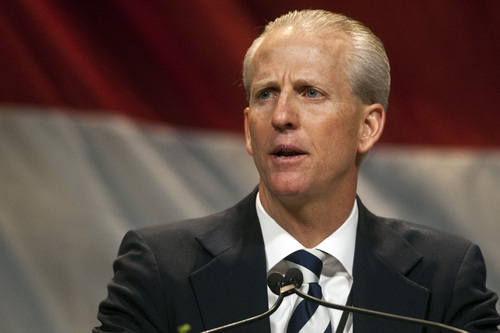This is an archived article that was published on sltrib.com in 2014, and information in the article may be outdated. It is provided only for personal research purposes and may not be reprinted.
Some Utah legislators are confused. Senate President Wayne Niederhauser is one of those.
He said this week that, since his Republican caucus has decided against debating any bills that have to do with same-sex marriage, they also should ignore a bill that would prevent discrimination against a minority group in Utah.
The only link between the two is that they both involve people in the lesbian, gay, bisexual and transgender community in Utah. But the issue now before the federal courts over whether Utah's ban on gay marriage is constitutional has nothing whatever to do with SB100, a bill would prohibit employers or landlords from denying jobs or housing based on a person's sexual orientation.
Adding to the confusion, Niederhauser threw "religious liberties" into his admonition against discussing SB100. Why would the Senate leader even imply that a Utahn is justified in denying a gay person a job or a place to live only because that Utahn's beliefs condone such discriminatory behavior?
Utah doesn't tolerate discrimination based on race, ethnicity or gender, because federal law doesn't allow it — and, we hope, because discrimination simply isn't right.
Sen. Stephen Urquhart, R-St. George, who is sponsoring SB100, put a sticky note on the door of the Senate chamber Friday that read "Hear SB100" and asked that other Utahns who oppose discrimination do likewise. And they did — by the hundreds.
But, rather than impressing conservative Republicans like Niederhauser with the momentum of public opinion supporting fair treatment of gays, the notes only convinced the Senate president that the issue is just too "emotional" to be addressed now.
What poppycock.
The notes are certainly not the only indication that Utahns want to outlaw discrimination against gays. A growing number of cities and counties have passed such laws, and The Church of Jesus Christ of Latter-day Saints endorsed the ordinance passed by Salt Lake City.
A poll conducted for The Tribune found that 60 percent of Utahns support a ban on workplace and housing discrimination, while 35 percent are opposed.
Nevertheless, a ban on discrimination against LGBT Utahns has been proposed in each legislative session for the past five years but only once — last year — has received committee approval.
Housing and employment rights for gays will pass eventually; there is no reason to delay any longer.



